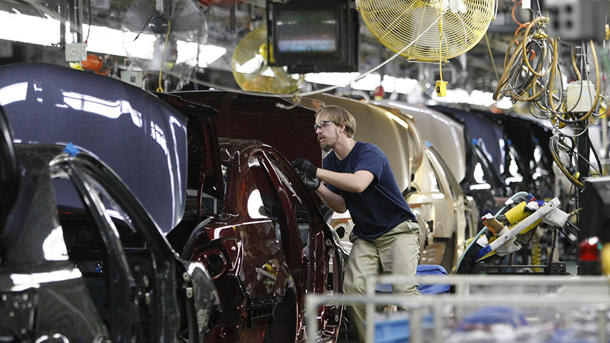
On Friday, Toyota Chief Executive Akio Toyoda and Kentucky officials are expected to announce a $530 million expansion of Toyota’s sprawling Georgetown factory in the Bluegrass State so that it can build 50,000 Lexus ES sedans a year. In return for adding 570 permanent jobs, Kentucky will give Toyota a package of tax breaks and other incentives worth $146.5 million. Such deals are so common they rarely draw comment, but it’s worth asking: Why does the world’s largest automaker need a handout?
To get the incentives, Toyota promised to hire up to 570 new full-time workers at the Georgetown plant, along with 180 temporary workers. As the Louisville Courier-Journal reports, those permanent employees will be paid an average of $26 an hour in wages and benefits, a bit more than half of what long-time employees in Georgetown make.
It would be unfair to Toyota to single it out for taking a path trod so often by other automakers and corporations; in fact, it’s unheard of for an automaker from General Motors to Mitsubishi to expand a plant without some kind of government gift. Last December, The New York Times counted up 35 different grants to Ford from Kentucky alone between 2007 and 2010, totaling $307 million — which came even as the company cut jobs.
And those breaks pale to the deals automakers bargain for when they open new plants, with the current record held by Volkswagen, whose Tennessee factory came with incentives that total $577 million over several years. In return for those incentives, VW vowed to hire 2,000 full-time workers, for a cost of about $288,500 per job, a ratio that was the highest ever for a new auto assembly plant in the United States. When Kia opened its plant in Georgia in 2009, it did so only after driving a hard bargain for a $400 million incentive package, including everything from school property tax breaks to a free rail spur to ship cars from the factory.
State and local governments give automakers endless breaks for several reasons. A new auto plant often means additional jobs from parts suppliers on top of the add-on boost to the local economy. In tough times for American workers, automotive manufacturing jobs ofter stability and wages well above what’s available in most service industry careers. And many state officials fear being held to answer why a project was lost if the pot wasn’t sweet enough.
—
How do you feel about this government intervention? Click below for the full article.